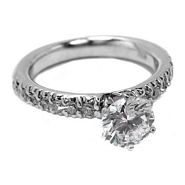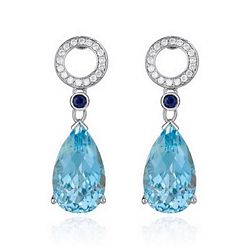How to Detect Fake Diamonds
NO ADSENSE ACCOUNT SELECTED FOR
GOOGLE ADSENSE
In this world of advanced technology it is almost impossible to simply look at a diamond and determine whether it is real or not especially if you don't know much about diamonds. You should also know that fake diamonds are everywhere and they come in many forms. The good news is; there are some steps that you can take to avoid thinking that you purchased a genuinely natural diamond but ended up owning a fake!
First and foremost, the obvious! Only deal with reputable jewelers, and when you find a reputable jeweler, stick with them. Avoid buying diamonds or other fine jewelry from jewelers that you have never dealt with before. Johnny come latelys and fly-by-nights are all too common in this business.
Secondly, know your jeweler’s background in terms of training, experience and certification. At the least, they should have the G.G. at the end of their name. The distinguished G.G. designation at the end of a jeweler’s name is instantly recognized around the world as the mark of a senior professional in the jewelry industry. This prestigious classification comes only from (GIA), the Gemological Institute of America Inc.
If they are American born and raised and in the jewelry business, they should at least be a graduate of the American Institute Of Diamond Cutting. This Institute is the only diamond cutting school in the United States that is licensed to teach the prestigious profession of diamond cutting and rough diamond grading in all its phases.
Some people are reading this and saying, “Your standards are too high!” On the surface it may seem like it. However, the reality is, when it comes to purchasing diamonds and other fine jewelry, you are investing a lot of money and you and every buyer should have the confidence and assurance that money is well spent. Dealing with trained and certified diamond professionals makes a world of difference! People who sell fake diamonds dread this part of the industry.
If a jeweler cannot provide you with any proof of certification and training from recognized industry institutes, you are taking chances in dealing with them! People who sell fake diamonds don’t need these certifications or training because their products don’t require it!
Thirdly, the jeweler should be member in good standing with one or more of these of these important industry organizations: the Jewelers Vigilance Committee, the Gemological Institute of America, The Jewelers Board of Trade and/or the Stop Blood Diamonds Organization.
Fourthly, get the certificate for the stone. A diamond certificate authenticates what type of stone you are getting and its value. If no certificate exists, do yourself a favor and walk away. No legitimate jeweler will refuse to provide the diamond certificate for a particular stone. If you find that you have purchased a fake diamond, you may be accused of making a switch when you return to the store of your purchase; therefore, it is important to have a certificate for the diamond. No two stones are alike.
Fourthly, the jeweler should provide you with a money back guarantee. This allows you ample time to have a diamond appraisal performed by an independent third party. This step is important because it confirms that the diamond is what they said it is.
|
Diamonds Are Forever
Buying Diamonds Guide | Diamond Rings | Diamond Earrings | Diamond Engagement Ring
Wedding Rings | Black Diamonds | Blue Diamond Ring | Diamond Bracelet | Tiffany Diamonds
Loose Diamonds | Fake Diamonds | Famous Diamonds | Bonded Diamonds | Colored Diamonds
Wholesale Diamonds | Platinum Wedding Ring | Diamond Solitaire Ring | Yellow Diamonds
Diamond Jewelry Resources
Jewelers Vigilance Committee | Gemological Institute of America | The Jewelers Board of Trade
American Institute Of Diamond Cutting
|
Blood Diamonds |
Stop Blood Diamonds
Join Stop Blood Diamonds |
Diamond Glossary |
Diamond FAQs |
Diamond Mine
The 4 C's of Diamonds | Diamond
Appraisal | Diamond Certificate
Fine Jewelry Resources
How To Find a
Great Jewelry Repair Shop | How To a Avoid Jewelry Repair
Fiasco | The Jewelry Repair
Guide
Man Made Diamonds
Apollo Diamond | CARAT
| Cubic Zirconia | Diamond Nexus |
Gemisis Cultured Diamond
Moissanite Jewelry | Russian
Diamonds | Swarovski Crystals |White
Sapphire
DIAMONDEXPERTS.BIZ is the leading diamond jewelry and fine jewelry resource on the Internet. We
provide up to date information on all types of diamonds and associated jewelry. Our primary mission is to help you
find the best deal possible on genuine diamond jewelry.
Copyright © Diamond Experts 1997-2012 All Rights Reserved.
Privacy Policy
Powered by the Buy Jewelry
Online
Diamond Experts
Diamond Cutters and Polishers, Goldsmiths, Top-Tier Designers and Diamond
Setting Masters
Antwerp Jewels & Diamond
Manufacturers
Antwerp / Belgium / Brazil / Canada / Europe / Italy / USA and
Worldwide



 Facebook
Facebook Twitter
Twitter Delicious
Delicious Livejournal
Livejournal Reddit
Reddit Stumbleupon
Stumbleupon Yahoo My Web
Yahoo My Web Google Bookmarks
Google Bookmarks BlinkList
BlinkList Digg
Digg Blogmarks
Blogmarks Diigo
Diigo Fark
Fark Ma.gnolia
Ma.gnolia Netvouz
Netvouz Newsvine
Newsvine Slashdot
Slashdot Spurl
Spurl Technorati
Technorati Wists
Wists